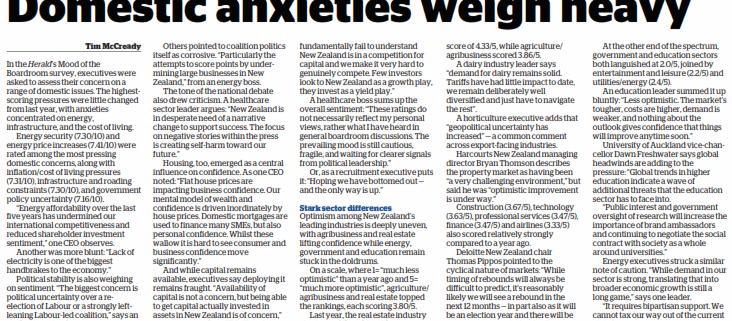Mood of the Boardroom: Domestic anxieties weigh heavy (NZ Herald)
Executives were asked to assess their level of concern on a range of domestic issues. The highest-scoring pressures were little changed from last year, with boardroom anxieties once again concentrated on energy, infrastructure, and the cost of living.
Energy security (7.26/10) and energy price increases (7.41/10) were rated among most pressing domestic concerns, along with inflation/cost of living pressures (7.27/10), infrastructure and roading constraints (7.33/10), and government policy uncertainty (7.15/10).
“Energy affordability over the last five years has undermined our international competitiveness and reduced shareholder investment sentiment,” one CEO observes.
Another was more blunt: “Lack of electricity is one of the biggest handbrakes to the economy.”
Political stability is also weighing on sentiment. “The biggest concern is political uncertainty over a re-election of Labour or a strongly left-leaning Labour-led coalition,” says an agribusiness leader.
Others pointed to coalition politics itself as corrosive. “Particularly the attempts to score points by undermining large businesses in New Zealand,” from an energy boss.
The tone of the national debate also drew criticism. A healthcare sector leader argues: “New Zealand is in desperate need of a narrative change to support success. The focus on negative stories within the press is creating self-harm toward our future.”
Housing, too, emerged as a central influence on confidence. As one CEO noted: “Flat house prices are impacting business confidence. Our mental model of wealth and confidence is driven inordinately by house prices. Domestic mortgages are used to finance many SMEs, but also personal confidence. Whilst these wallow it is hard to see consumer and business confidence move significantly.”
And while capital remains available, executives say deploying it remains fraught.
“Availability of capital is not a concern, but being able to get capital actually invested in assets in New Zealand is of concern,” says an energy firm CEO. “Regulators fundamentally fail to understand New Zealand is in a competition for capital and we make it very hard to genuinely compete. Few investors look to New Zealand as a growth play, they invest as a yield play.”
A healthcare boss sums up the overall sentiment: “These ratings do not necessarily reflect my personal views, rather what I have heard in general boardroom discussions. The prevailing mood is still cautious, fragile, and waiting for clearer signals from political leadership.”
Or, as a recruitment executive puts it more simply: “Hoping we have bottomed out – and the only way is up.”
Stark sector differences in optimism
Optimism among New Zealand’s leading industries is deeply uneven, with agribusiness and real estate lifting confidence while energy, government and education remain stuck in the doldrums.
On a scale, where 1= ‘much less optimistic’ than a year ago and 5= ‘much more optimistic’, agriculture/agribusiness and real estate topped the rankings, each scoring 3.80/5.
Last year, the real estate industry also topped the table with an average score of 4.33/5, while agriculture/agribusiness scored 3.86/5.
A dairy industry leader said “demand for dairy remains solid. Tariffs have had little real impact to date. We remain deliberately well diversified and just have to navigate the rest”.
A horticulture executive adds that “geopolitical uncertainty has increased” – a common comment across export-facing industries.
Harcourts New Zealand managing director Bryan Thomson describes the property market as having been “a very challenging environment,” but said he was “optimistic improvement is underway.”
Construction (3.67/5), technology (3.63/5), professional services (3.47/5), finance (3.47/5) and airlines (3.33/5) also scored relatively strongly compared to a year ago.
Deloitte New Zealand chair Thomas Pippos pointed to the cyclical nature of markets: “While timing of rebounds will always be difficult to predict, it’s reasonably likely we will see a rebound in the next 12 months – in part also as it will be an election year and there will be some government stimulus.”
At the other end of the spectrum, government and education sectors both languished at 2.0/5, joined by entertainment and leisure (2.2/5) and utilities/energy (2.4/5).
An education leader summed it up bluntly: “Less optimistic. The market’s tougher, costs are higher, demand is weaker, and nothing about the outlook gives confidence that things will improve anytime soon.”
University of Auckland vice chancellor Dawn Freshwater says global headwinds are adding to the pressure: “Global trends in higher education indicate a wave of additional threats that the education sector has to face into.
“Public interest and government oversight of research will increase the importance of brand ambassadors and continuing to negotiate the social contract with society as a whole around universities.”
Energy executives struck a similar note of caution. “While demand in our sector is strong, translating that into broader economic growth is still a long game,” says one leader. “It requires bipartisan support. We cannot tax our way out of the current state.”



